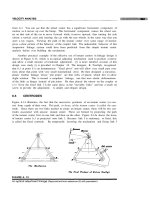Economic Policy Thoughts for Today and Tomorrow phần 4 pptx
Bạn đang xem bản rút gọn của tài liệu. Xem và tải ngay bản đầy đủ của tài liệu tại đây (825.7 KB, 12 trang )
24 ECONOMIC POLICY
he could not illustrate his thesis by any examples other
than those drawn from the conditions of precapitalistic
society. In precapitalistic ages, society was divided into
hereditary status groups, which in India are called
"castes/' In a status society a man was not, for example,
born a Frenchman; he was born as a member of the
French aristocracy or of the French bourgeoisie or of the
French peasantry. In the greater part of the Middle Ages,
he was simply a
serf.
And serfdom, in France, did not
disappear completely until after the American Revolu-
tion. In other parts of Europe it disappeared even later.
But the worst form in which serfdom existed—and
continued to exist even after the abolition of slavery—
was in the British colonies abroad. The individual inher-
ited his status from his parents, and he retained it
throughout his life. He transferred it to his children.
Every group had privileges and disadvantages. The
highest groups had only privileges, the lowest groups
only disadvantages. And there was no way a man could
rid himself of the legal disadvantages placed upon him
by his status other than by fighting a political struggle
against the other classes. Under such conditions, you
could say that there was an "irreconcilable conflict of
interests between the slave owners and the slaves," be-
cause what the slaves wanted was to be rid of their slav-
ery, of their quality of being slaves. This meant a loss,
however, for the owners. Therefore, there is no question
that there had to be this irreconcilable conflict of interests
between the members of the various classes.
One must not forget that in those ages—in which the
status societies were predominant in Europe, as well as
in the colonies which the Europeans later founded in
America—people did not consider themselves to be con-
nected in any special way with the other classes of their
Socialism 25
own nation; they felt much more at one with the mem-
bers of their own class in other countries. A French aris-
tocrat did not look upon lower class Frenchmen as his
fellow citizens; they were the "rabble/' which he did not
like.
He regarded only the aristocrats of other coun-
tries—those of Italy, England,and Germany, for instance,
as his equals.
The most visible effect of this state of affairs was the
fact that the aristocrats all over Europe used the same
language. And this language was French, a language
which was not understood, outside France, by other
groups of the population. The middle classes—the bour-
geoisie—had their own language, while the lower
classes—the peasantry—used local dialects which very
often were not understood by other groups of the popu-
lation. The same was true with regard to the way people
dressed. When you travelled in 1750 from one country
to another, you found that the upper classes, the aristo-
crats,
were usually dressed in the same way all over
Europe, and you found that the lower classes dressed
differently. When you met someone in the street, you
could see immediately—from the way he dressed—to
which class, to which status he belonged.
It is difficult to imagine how different these conditions
were from present-day conditions. When I come from
the United States to Argentina and I see a man on the
street, I cannot know what his status is. I only assume
that he is a citizen of Argentina and that he is not a
member of some legally restricted group. This is one
thing that capitalism has brought about. Of course, there
are also differences within capitalism. There are differ-
ences in wealth, differences which Marxians mistakenly
consider to be equivalent to the old differences that ex-
isted between men in the status society.
26 ECONOMIC POLICY
The differences within a capitalist society are not the
same as those in a socialist society. In the Middle Ages—
and in many countries even much later—a family could
be an aristocrat family and possess great wealth, it could
be a family of dukes for hundreds and hundreds of
years,
whatever its qualities, its talents, its character or
morals. But, under modern capitalistic conditions, there
is what has been technically described by sociologists as
"social mobility." The operating principle of this social
mobility, according to the Italian sociologist and econo-
mist Vilfredo Pareto, is "la circulation des elites" (the
circulation of the elites). This means that there are al-
ways people who are at the top of the social ladder, who
are wealthy, who are politically important, but these
people—these elites—are continually changing.
This is perfectly true in a capitalist society. It was not
true for a precapitalistic status society. The families who
were considered the great aristocratic families of Europe
are still the same families today or, let us say, they are
the descendants of families that were foremost in
Europe, 800 or 1000 or more years ago. The Capetians
of Bourbon—who for a very long time ruled here in
Argentina—were a royal house as early as the tenth cen-
tury. These kings ruled the territory which is known
now as the Ile-de-France, extending their reign from gen-
eration to generation. But in a capitalist society, there is
continuous mobility—poor people becoming rich and
the descendants of those rich people losing their wealth
and becoming poor.
Today I saw in a bookshop in one of the central streets
of Buenos Aires the biography of a businessman who
was so eminent, so important, so characteristic of big
business in the nineteenth century in Europe that, even
in this country, far away from Europe, the bookshop
Socialism 27
carried copies of his biography. I happen to know the
grandson of this man. He has the same name his grand-
father had, and he still has a right to wear the title of
nobility which his grandfather—who started as a black-
smith—had received eighty years ago. Today this grand-
son is a poor photographer in New York City.
Other people, who were poor at the time this photog-
rapher's grandfather became one of Europe's biggest in-
dustrialists, are today captains of industry. Everyone is
free to change his status. That is the difference between
the status system and the capitalist system of economic
freedom, in which everyone has only himself to blame
if he does not reach the position he wants to reach.
The most famous industrialist of the twentieth century
up to now is Henry Ford. He started with a few hundred
dollars which he had borrowed from his friends, and
within a very short time he developed one of the most
important big business firms of the world. And one can
discover hundreds of such cases every day.
Every day, the New York
Times
prints long notices of
people who have died. If you read these biographies,
you may come across the name of an eminent business-
man,
who started out as a seller of newspapers at street
corners in New York. Or he started as an office boy, and
at his death he was the president of the same banking
firm where he started on the lowest rung of the ladder.
Of course, not all people can attain these positions. Not
all people want to attain them. There are people who are
more interested in other problems and, for these people,
other ways are open today which were not open in the
days of feudal society, in the ages of the status society.
The socialist system, however,
forbids
this fundamen-
tal freedom to choose one's own career. Under socialist
conditions, there is only one economic authority, and it
28 ECONOMIC POLICY
has the right to determine all matters concerning pro-
duction.
One of the characteristic features of our day is that
people use many names for the same thing. One syno-
nym for socialism and communism is "planning." If peo-
ple speak of "planning" they mean, of course, central
planning, which means one plan made by
the
government—
one plan that prevents planning by anyone except the
government.
A British lady, who also is a member of the Upper
House, wrote a book entitled Plan or No Plan, a book
which was quite popular around the world. What does
the title of her book mean? When she says "plan," she
means only the type of plan envisioned by Lenin and
Stalin and their successors, the type which governs all
the activities of all the people of a nation. Thus, this lady
means a central plan which excludes all the personal
plans that individuals may have. Her title Plan or No
Plan is therefore an illusion, a deception; the alternative
is not a central plan or no plan, it is the
total
plan of a
central governmental authority or freedom for individu-
als to make their own plans, to do their own planning.
The individual plans his life, every day, changing his
daily plans whenever he will.
The free man plans daily for his needs; he says, for
example: "Yesterday I planned to work all my life in
Cordoba." Now he learns about better conditions in Bue-
nos Aires and changes his plans, saying: "Instead of
working in Cordoba, I want to go to Buenos Aires." And
that is what freedom means. It may be that he is mis-
taken, it may be that his going to Buenos Aires will turn
out to have been a mistake. Conditions may have been
better for him in Cordoba, but he himself made his plans.
Socialism 29
Under government planning, he is like a soldier in an
army. The soldier in the army does not have the right to
choose his garrison, to choose the place where he will
serve. He has to obey orders. And the socialist system—
as Karl Marx, Lenin, and all socialist leaders knew and
admitted—is the transfer of army rule to the whole pro-
duction system. Marx spoke of "industrial armies/' and
Lenin called for "the organization of everything—the
postoffice, the factory, and other industries, according
to the model of the army."
Therefore, in the socialist system everything depends
on the wisdom, the talents, and the gifts of those people
who form the supreme authority. That which the su-
preme dictator—or his committee—does not know, is
not taken into account. But the knowledge which man-
kind has accumulated in its long history is not acquired
by everyone; we have accumulated such an enormous
amount of scientific and technical knowledge over the
centuries that it is humanly impossible for one individ-
ual to know all these things, even though he be a most
gifted man.
And people are different, they are unequal. They al-
ways will be. There are some people who are more gifted
in one subject and less in another one. And there are
people who have the gift to find new paths, to change
the trend of knowledge. In capitalist societies, techno-
logical progress and economic progress are gained
through such people. If a man has an idea, he will try to
find a few people who are clever enough to realize the
value of his idea. Some capitalists, who dare to look into
the future, who realize the possible consequences of such
an idea, will start to put it to work. Other people, at first,
may say: "They are fools"; but they will stop saying so
30 ECONOMIC POLICY
when they discover that this enterprise, which they
called foolish, is flourishing, and that people are happy
to buy its products.
Under the Marxian system, on the other hand, the
supreme government body must first be convinced of
the value of such an idea before it can be pursued and
developed. This can be a very difficult thing to do, for
only the group of people at the head—or the supreme
dictator himself—has the power to make decisions. And
if these people—because of laziness or old age, or be-
cause they are not very bright and learned—are unable
to grasp the importance of the new idea, then the new
project will not be undertaken.
We can think of examples from military history. Na-
poleon was certainly a genius in military affairs; he had
one serious problem, however, and his inability to solve
that problem culminated, finally, in his defeat and exile
to the loneliness of St. Helena. Napoleon's problem was:
"How to conquer England?" In order to do that, he
needed a navy to cross the English Channel, and there
were people who told him they had a way to accomplish
that crossing, people who—in an age of sailing ships—
had come up with the new idea of steam ships. But Na-
poleon did not understand their proposal.
Then there was Germany's
Generalstab,
the famous
German general
staff.
Before the First World War, it was
universally considered to be unsurpassed in military
wisdom. A similar reputation was held by the staff of
General Foch in France. But neither the Germans nor the
French—who, under the leadership of General Foch,
later defeated the Germans—realized the importance of
aviation for military purposes., The German general staff
said: "Aviation is merely for pleasure, flying is good for
idle people. From a military point of view, only the Zep-
Socialism 31
pelins are important/' and the French general staff was
of the same opinion.
Later, during the period between World War I and
World War II, there was a general in the United States
who was convinced that aviation would be very impor-
tant in the next war. But all other experts in the United
States were against him. He could not convince them. If
you have to convince a group of people who are not
directly dependent on the solution of a problem, you
will never succeed. This is true also of noneconomic
problems.
There have been painters, poets, writers, composers,
who complained that the public did not acknowledge
their work and caused them to remain poor. The public
may certainly have had poor judgment, but when these
artists said: "The government ought to support great
artists, painters, and writers/' they were very much in
the wrong. Whom should the government entrust with
the task of deciding whether a newcomer is really a great
painter or not? It would have to rely on the judgment of
the critics, and the professors of the history of art who
are always looking back into the past yet who very rarely
have shown the talent to discover new genius. This is the
great difference between a system of "planning" and a
system in which everyone can plan and act for himself.
It is true, of course, that great painters and great writ-
ers have often had to endure great hardships. They
might have succeeded in their art, but not always in
getting money. Van Gogh was certainly a great painter.
He had to suffer unbearable hardship and, finally, when
he was thirty-seven years old, he committed suicide. In
all his life he sold only one painting and the buyer of it
was his cousin. Apart from this one sale, he lived from
the money of his brother, who was not an artist nor a
32 ECONOMIC POLICY
painter. But van Gogh's brother understood a painter's
needs.
Today you cannot buy a van Gogh for less than
hundred or two hundred thousand dollars.
Under a socialist system, van Gogh's fate might have
been different. Some government official would have
asked some well-known painters (whom van Gogh cer-
tainly would not have regarded as artists at all) whether
this young man, half or completely crazy, was really a
painter worthy to be supported. And they without a
doubt, would have answered: "No, he is not a painter;
he is not an artist; he is just a man who wastes paint;"
and they would have sent him into a milk factory or into
a home for the insane. Therefore all this enthusiasm in
favor of socialism by the rising generation of painters,
poets,
musicians, journalists, actors, is based on an illu-
sion.
I mention this because these groups are among the
most fanatical supporters of the socialist idea.
When it comes to choosing between socialism and
capitalism as an economic system, the problem is some-
what different. The authors of socialism never suspected
that modern industry, and all the operations of modern
business, are based on calculation. Engineers are by no
means the only ones who make plans on the basis of
calculations, businessmen also must do so. And busi-
nessmen's calculations are all based on the fact that, in
the market economy, the money prices of goods inform
not only the consumer, they also provide vital informa-
tion to businessmen about the factors of production, the
main function of the market being not merely to deter-
mine the cost of the last part of the process of production
and transfer of goods to the hands of the consumer, but
the cost of those steps leading up to it. The whole market
system is bound up with the fact that there is a mentally
calculated division of labor between the various busi-
Socialism 33
nessmen who vie with each other in bidding for the fac-
tors of production—the raw materials, the machines, the
instruments—and for the human factor of production,
the wages paid to labor. This sort of calculation by the
businessman cannot be accomplished in the absence of
prices supplied by the market.
At the very instant you abolish the market—which is
what the socialists would like to do—you render useless
all the computations and calculations of the engineers
and technologists. The technologists can give you a great
number of projects which, from the point of view of the
natural sciences, are equally feasible, but it takes the
market-based calculations of the businessman to make
clear which of those projects is the most advantageous,
from the
economic
point of view.
The problem with which I am dealing here is the fun-
damental issue of capitalistic economic calculation as op-
posed to socialism. The fact is that economic calculation,
and therefore all technological planning, is possible only
if there are money prices, not only for consumer goods
but also for the factors of production. This means there
has to be a market for raw materials, for all half-finished
goods, for all tools and machines, and for all kinds of
human labor and human services.
When this fact was discovered, the socialists did not
know how to respond. For 150 years they had said: "All
the evils in the world come from the fact that there are
markets and market prices. We want to abolish the mar-
ket and with it, of course, the market economy, and sub-
stitute for it a system without prices and without mar-
kets."
They wanted to abolish what Marx called the
"commodity character" of commodities and of labor.
When faced with this new problem, the authors of
socialism, having no answer, finally said: "We will not
34 ECONOMIC POLICY
abolish the market altogether; we will pretend that a
market exists; we will play market, like children who
play school/' But everyone knows that when children
play school, they do not learn anything. It is just an exer-
cise, a game, and you can "play" at many things.
This is a very difficult and complicated problem and
in order to deal with it in full one needs a little more
time than I have here. I have explained it in detail in
my writings. In six lectures I cannot enter into an analy-
sis of all its aspects. Therefore, I want to advise you, if
you are interested in the fundamental problem of the
impossibility of calculation and planning under social-
ism,
read my book Human Action, which is available in
an excellent Spanish translation.
But read other books, too, like the book of the Norwe-
gian economist Trygve
Hoff,
who wrote on economic
calculation. And if you do not want to be one-sided, I
recommend that you read the highly-regarded socialist
book on this subject by the eminent Polish economist
Oskar Lange, who at one time was a professor at an
American university, then became a Polish ambassador,
and later returned to Poland.
You will probably ask me: "What about Russia? How
do the Russians handle this question?" This changes the
problem. The Russians operate their socialistic system
within a world in which there are prices for all the fac-
tors of production, for all raw materials, for everything.
They can therefore employ, for their planning, the foreign
prices of the world market. And because there are certain
differences between conditions in Russia and those in
United States, the result is very often that the Russians
consider something to be justified and advisable—from
their economic point of view—that the Americans would
not consider economically justifiable at all.
Socialism 35
The "Soviet experiment/' as it was called, does not
prove anything. It does not tell us anything about the
fundamental problem of socialism, the problem of calcu-
lation. But are we entitled to speak of it as an experi-
ment? I do not believe there is such a thing as a scientific
experiment in the field of human action and economics.
You cannot make laboratory experiments in the field of
human action because a scientific experiment requires
that you do the same thing under various conditions, or
that you maintain the same conditions, changing per-
haps only one factor. For instance, if you inject into a
cancerous animal some experimental medication, the re-
sult may be that the cancer will disappear. You can test
this with various animals of the same kind which suffer
from the same malignancy. If you treat some of them
with the new method and do not treat the rest, then you
can compare the result. You cannot do this within the
field of human action. There are no laboratory experi-
ments in human action.
The so-called Soviet "experiment" merely shows that
the standard of living is incomparably lower in Soviet
Russia than it is in the country that is considered, by the
whole world, as the paragon of capitalism: the United
States.
Of course, if you tell this to a socialist, he will say:
"Things are wonderful in Russia." And you tell him:
"They may be wonderful, but the average standard of
living is much lower." Then he will answer: "Yes, but
remember how terrible it was for the Russians under the
tsars and how terrible a war we had to fight."
I do not want to enter into discussion of whether this is
or is not a correct explanation, but if you deny that the
conditions are the same, you deny that it was an experi-
ment. You must then say this (which would be much









